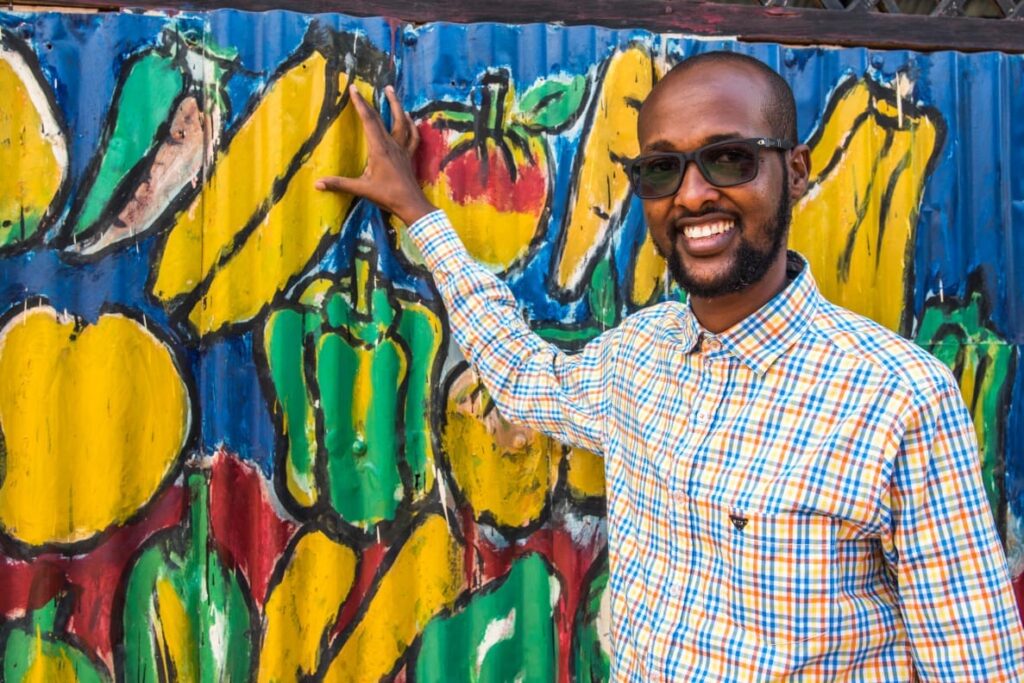ADF STAFF
In a secondhand studio in Kenya’s sprawling Dadaab refugee camp, Abdullahi Mire takes to the air for an hour each weekday morning on Radio Gargar to educate the camp’s residents on the risks and ways to prevent COVID-19.
In the 30 years since the United Nations created Dadaab to house Somalis fleeing civil war in their homeland, the complex has grown to encompass more than 217,000 residents, making it more populous than all but four of Kenya’s cities. Like a city, it has streets and shops and electricity. But it remains a place very much on the fringes of Kenyan society.
Dadaab’s physical and social isolation helped keep the area free of the coronavirus for months after Kenya reported its first infection in March. On May 18, COVID-19 arrived in Dadaab, and with it plenty of confusion, rumors and misinformation.
That’s when Mire, 33, a freelance journalist who grew up in Dadaab, stepped up. At the time, he was living nearly 500 kilometers away in the capital, Nairobi.
He had lived in Dadaab starting at age 3. His two siblings were born there. His mother worked as a nurse there with Doctors Without Borders. His father died there three years after the family fled the outbreak of hostilities in Somalia in 1991. Mire graduated from high school and college while living there. Despite its problems, Dadaab was home.
“As soon as the news of the coronavirus arrived in Nairobi, I decided to pack my bags and return to the Dadaab refugee camp to help my community,” Mire told Internews, an international nonprofit news organization.
He began broadcasting from 10 a.m. until 11 a.m. from a repurposed U.N. shipping container. His mission was to dispel uncertainty and provide his listeners in Dadaab and the surrounding areas of Garissa County with valid, helpful information to protect themselves. His fans call him “Corona Guy.”
Corona Guy’s chief message: “Don’t panic.”
His second message is plain on his Twitter page: “Stop Coronavirus. Wash your hands.”
Mire works with the Kenya Red Cross and other aid groups, community leaders and sources in Dadaab who provide him with public health information, policy changes and reports on rumors circulating in complex’s three camps. He adds in COVID-19 news from Kenya and Somalia and also takes callers’ questions about the virus — yet another attempt to tamp down rumors.
On the air and via his social media channels, Mire supplies his audience with information they can use to prevent the spread of the potentially fatal respiratory disease. In a community with no internet and limited resources, Dadaab’s lone radio station has become the best vehicle for getting the message out, Mire told Coda Media, an online crisis reporting news platform.
To drive home that message, Mire brings experts on his program to provide the voice of authority.
“Most of the community are not even concerned about the virus,” Mire told Coda. “People say, ‘We are black, our sun is hot,’ in the belief that both factors offer some form of protection against infection.”
With cramped housing, long lines for basic supplies and limited availability of running water, Dadaab offers an environment ripe for a major outbreak of COVID-19 if the residents don’t take precautions, Dr. John Kiogora told Coda.
In a nutshell, Dadaab is not built for social distancing.
“You queue for everything,” Mire told Coda. “Social distancing is not something you can do here when hundreds of people share just one tap for water.”
His COVID-19 radio show is not Mire’s first community-oriented undertaking. In 2018, he started Refugee Youth Education Hub, focused on developing Dadaab’s youth, which account for more than 50% of its population. One of the hub’s projects is the Dadaab Book Drive, begun to fight illiteracy and, Mire hopes, combat radicalization among Dadaab’s young people.
“I believe it is my duty to help you in any way possible,” he told Coda.
Mire sees his hour on the air in Dadaab and the education it provides as vital to defeating COVID-19. Information is the community’s most potent weapon, he said.
“Through correct, timely information, I believe we can overcome the virus and COVID-19,” Mire told Internews.

